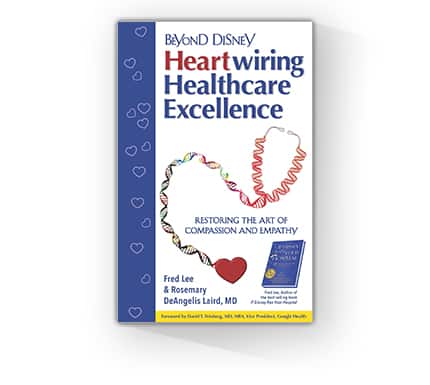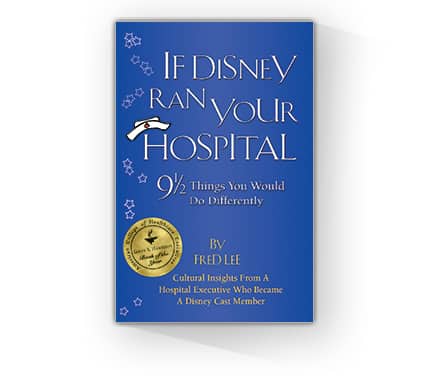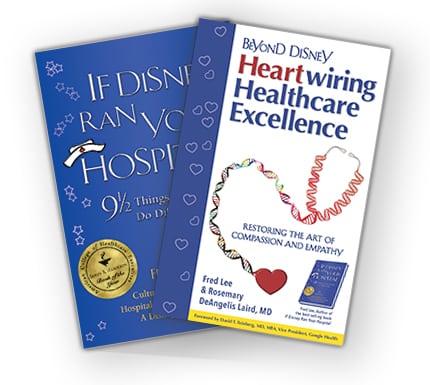
Available in
Hardcover: $38.00
Paperback: $28.00

Available in
Hardcover: $37.00
Paperback: $27.00

Available in
Hardcover: $75.00
Paperback: $55.00
Fred Lee changed the discussion about the patient experience with his bestselling book If Disney Ran Your Hospital—9 ½ Things You Would Do Differently. With the release of Beyond Disney: Heartwiring Healthcare Excellence—Restoring the Art of Compassion and Empathy, Fred and co-author Dr. Rosemary Laird encourage all of us to raise the bar again.
To be Heartwired is to know and use the patient’s story to provide quality care with genuine compassion and empathy. Every patient is a person who has a story, not a “case” distinguished by a diagnosis.
Presented in easy, relatable sections:
Section 1: In their easy and relatable style, Lee and Laird set the stage by reviewing the origins of our current value-based and patient-centered world and makes a strong case that healthcare needs to be Heartwired. It covers the journey that healthcare has traveled into service excellence which then led to quality management for healthcare. Interspersed with stories, the section ends with how to close the gap between knowing and doing.
Section 2: Moves from theory to action in how we can become Heartwired. A review of emerging science provides the evidence base, including an updated perspective on the bio-psycho-social model, the “placebo effect.” Researchers have identified that the provider-patient relationship itself is part of the “placebo effect.” To further develop clinicians with empathy, the book looks to the emerging field of narrative medicine. The power of the patient’s story is indeed a necessary tenet of being Heartwired.
Section 3: The authors don’t shy away from the “elephant in the room” as they directly confront the question: Can healthcare afford to be Heartwired? From improving clinical quality, patient outcomes, and satisfaction, they explore how Heartwiring pays dividends in performance and production across a wide range of clinical settings.
At the end of the book, there is the Heartwired Toolkit to assist in developing a healthy Heartwired culture and sustaining it. The toolkit has stories, exercises, and retreat outlines for Heartwired teams to work together and grow.
Lee and Laird believe Heartwiring Healthcare Excellence will lead to patients experiencing the best of what healthcare has to offer: individuals as technically proficient as they are compassionate and empathetic.
This captivating book, If Disney Ran Your Hospital—9 1/2 Things You Would Do Differently, filled with stories and examples will leave its readers inspired with fresh insights and energized with hope. It needs to be in every hospital manager’s library and required reading for every healthcare employee.
Fred Lee had the enviable distinction of having been both a healthcare executive of a major medical center and a cast member at Disney University. With an insider’s experience and a keen eye for cultural comparisons, he shares his passion and concepts of creating an exceptional patient experience and compassion of caregivers.
The 9½ principles in this engaging and refreshing book will help any hospital team gain the extraordinary competitive advantage. Some of those 9½ principles are: Make Courtesy More Important than Efficiency; Decentralize the Authority to say YES; Change the Concept of Work from Service to Theater; Measure to Improve, Not to Impress; Harness the Motivating Power of Imagination; Create a Climate of Dissatisfaction; and Close the Gap Between Knowing and Doing.
One of the key thoughts of the book is to teach the main difference between a service and an experience. It will explain the three levels of care. The bottom layer is our competence, the next layer is courtesy, and the top layer is compassion. It goes on to teach your staff about the power of compassion and remember, scores do not motivate people, stories do. The imagination created by stories is a gold mine for motivation and taking action.
And finally, it teaches how to hire and coach for an individual’s “role” in the patient’s experience.
One of Fred Lee’s favorite quotes by Johann Wolfgang von Goethe was: “Knowing is not enough. We must apply. Willing is not enough. We must do.”